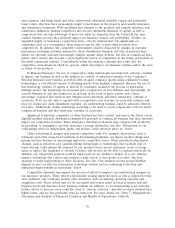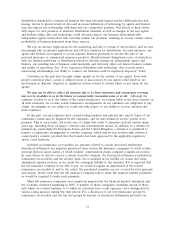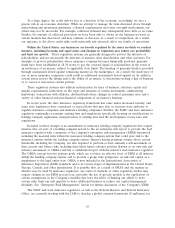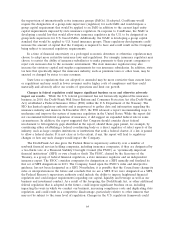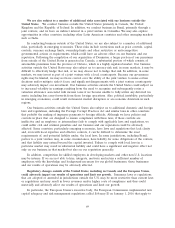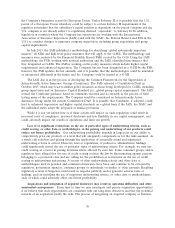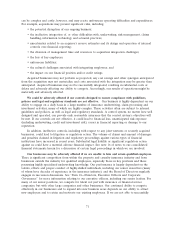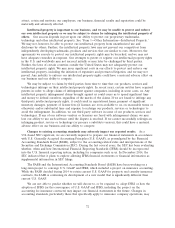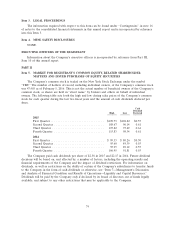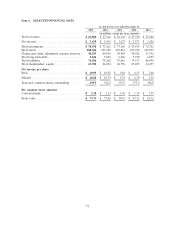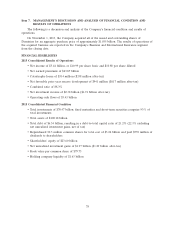Travelers 2015 Annual Report Download - page 69
Download and view the complete annual report
Please find page 69 of the 2015 Travelers annual report below. You can navigate through the pages in the report by either clicking on the pages listed below, or by using the keyword search tool below to find specific information within the annual report.We are also subject to a number of additional risks associated with our business outside the
United States. We conduct business outside the United States primarily in Canada, the United
Kingdom and the Republic of Ireland. In addition, we conduct business in Brazil, primarily through a
joint venture, and we have an indirect interest in a joint venture in Colombia. We may also explore
opportunities in other countries, including other Latin American countries and other emerging markets
such as India.
In conducting business outside of the United States, we are also subject to a number of additional
risks, particularly in emerging economies. These risks include restrictions such as price controls, capital
controls, currency exchange limits, ownership limits and other restrictive or anti-competitive
governmental actions or requirements, which could have an adverse effect on our business and our
reputation. Following the completion of our acquisition of Dominion, a larger portion of our premiums
from outside of the United States is generated in Canada, a substantial portion of which consists of
automobile premiums from the province of Ontario, which is a highly regulated market. Our business
activities outside the United States may also subject us to currency risk and, in some markets, it may be
difficult to effectively hedge that risk, or we may choose not to hedge that risk. In addition, in some
markets, we may invest as part of a joint venture with a local counterparty. Because our governance
rights may be limited, we may not have control over the ability of the joint venture to make certain
decisions and/or mitigate risks it faces, and significant disagreements with a joint venture counterparty
may adversely impact our investment. Our business activities outside the United States could subject us
to increased volatility in earnings resulting from the need to recognize and subsequently revise a
valuation allowance associated with income taxes if we became unable to fully utilize any deferred tax
assets, including loss carry-forwards from those foreign operations. Also, political instability, particularly
in emerging economies, could result in financial market disruption or an economic downturn in such
regions.
Our business activities outside the United States also subject us to additional domestic and foreign
laws and regulations, including the Foreign Corrupt Practices Act and similar laws in other countries
that prohibit the making of improper payments to foreign officials. Although we have policies and
controls in place that are designed to ensure compliance with these laws, if those controls are
ineffective and an employee or intermediary fails to comply with applicable laws and regulations, we
could suffer civil and criminal penalties and our business and our reputation could be adversely
affected. Some countries, particularly emerging economies, have laws and regulations that lack clarity
and, even with local expertise and effective controls, it can be difficult to determine the exact
requirements of, and potential liability under, the local laws. In some jurisdictions, including Brazil,
parties to a joint venture may, in some circumstances, have liability for some obligations of the venture,
and that liability may extend beyond the capital invested. Failure to comply with local laws in a
particular market may result in substantial liability and could have a significant and negative effect not
only on our business in that market but also on our reputation generally.
In addition, competition for skilled employees in developing markets and other non-U.S. locations
may be intense. If we are not able to hire, integrate, motivate and retain a sufficient number of
employees with the knowledge and background necessary for our global businesses, those businesses
and our results of operations may be adversely affected.
Regulatory changes outside of the United States, including in Canada and the European Union,
could adversely impact our results of operations and limit our growth. Insurance laws or regulations
that are adopted or amended in jurisdictions outside the U.S. may be more restrictive than current laws
or regulations and may result in lower revenues and/or higher costs of compliance and thus could
materially and adversely affect our results of operations and limit our growth.
In particular, the European Union’s executive body, the European Commission, implemented new
capital adequacy and risk management regulations called Solvency II on January 1, 2016 that apply to
69


